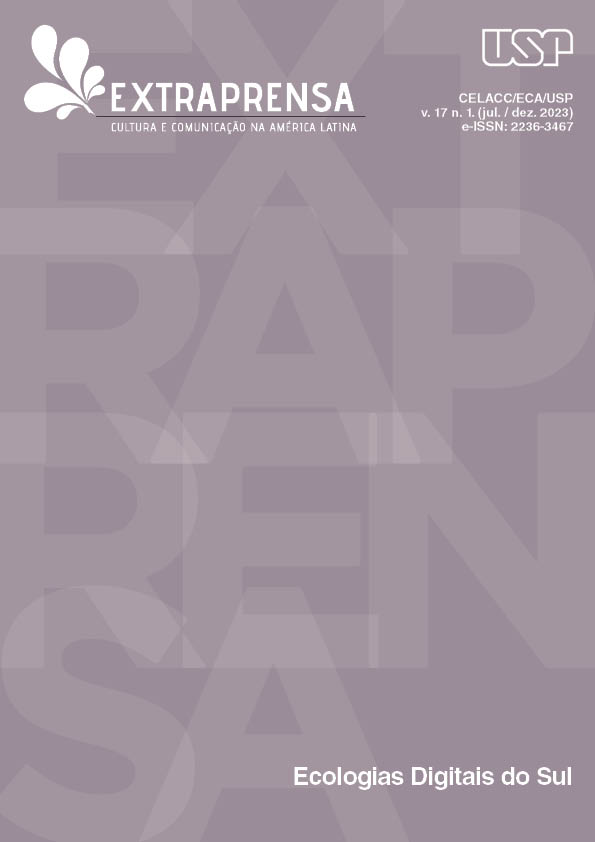Climate as a new urban common: thermal comfort on the right to the city agenda
DOI:
https://doi.org/10.11606/extraprensa2024.219263Keywords:
Urban commons resources, Right to the city, Urban climate, Thermal comfort, Cool commonsAbstract
This article seeks to contribute to the theoretical debate on the urbanization process and its impact on the use of common resources in cities (urban commons) in the face of climate change inherent in the contemporary urbanization model. Parks, streets, buildings, energy, and water are recognized as urban common goods, however, with the increase in climatic risks inherent to the process of densification of these spaces, the increase in temperatures has generated discomfort and health problems for its inhabitants. In this work, we approach the climate as a common good, associated with the concern of climate change in cities from the concept of thermal comfort (cooling the commons). Based on a dialectical approach to the contradictions and limits of Ostrom's theory of the commons adapted to the urban context, we aim to contribute to the theoretical debate on urban commons through articulation with Lefebvre's “right to the city” claims. In order to go beyond the public-private antithesis, State-market, it is possible to rethink shared and sustainable practices and alternatives for the social production of space so that urban praxis is socially and environmentally fair for all.
Downloads
References
AKBARI, H. et al. The urban heat island: Causes and impacts. Cooling our communities, p. 5-25, 1992.
BLOMLEY, Nicholas K. Unsettling the city: Urban land and the politics of property. Psychology Press, 2004.
BOLLIER, David. Think like a commoner: A short introduction to the life of the commons. New Society Publishers, 2014.
DE ABREU, R. C. et al. Attribution of detected temperature trends in Southeast Brazil. Geophysical Research Letters, v. 46, n. 14, p. 8407-8414, 2019.
DELLENBAUGH, Mary et al. (Ed.). Bem comuns urbanos: indo além do estado e do mercado . Birkhäuser, 2015.
FARIAS, André Rodrigo et al. Identificação, mapeamento e quantificação das áreas urbanas do Brasil. Embrapa Gestão Territorial-Comunicado Técnico (INFOTECA-E), 2017.
FATIGATI, Flavio Laurenza. Estudo da variação da temperatura da superfície do município de São Paulo no período 1991-2006 com a utilização de imagens termais do satélite LANDSAT-5 TM. Anais do XIV Simpósio brasileiro de sensoriamento remoto. Natal: INPE, p. 25-30, 2009.
FIORAVANTI, Carlos et al. Um Brasil mais quente. Pesquisa Fapesp, São Paulo, n. 130, 2006.
GEIRINHAS, João L. et al. Climatic and synoptic characterization of heat waves in Brazil. International Journal of Climatology, v. 38, n. 4, p. 1760-1776, 2018.
GUO, Yuming et al. Heat wave and mortality: a multicountry, multicommunity study. Environmental health perspectives, v. 125, n. 8, p. 087006, 2017.
HARDIN, Garrett. The tragedy of the commons. Journal of Natural Resources Policy Research, v. 1, n. 3, p. 243-253, 2009.
HARDT, Michael; NEGRI, Antonio. Commonwealth. Harvard University Press, 2009.
HARVEY, David. Rebel cities: From the right to the city to the urban revolution. Verso books, 2012.
INMET. Instituto Nacional de Meteorologia. Disponível em: <https://portal.inmet.gov.br/>. Acesso em: 20 de maio de 2021.
LEFEBVRE, Henri. A revolução urbana. Belo Horizonte. Humanitas, 1999.
_____________. LEFEBVRE, Henri; À CIDADE, O. Direito. tradução Rubens Eduardo Frias. O direito à cidade. São Paulo: Centauro, 2001.
LOMBARDO, Magda Adelaide. Ilha de calor nas metrópoles: o exemplo de São Paulo. Editora Hucitec com apoio de Lalekla SA Comércio e Indústria, 1985.
MELLICK LOPES, Abby et al. Cooling Common Spaces in Densifying Urban Environments: A Review of Best Practice and Guide for Western Sydney Renewal. 2020.
MENDONÇA, Francisco; MONTEIRO, CA de F. Clima urbano. São Paulo: Contexto, v. 2, 2003.
OKE, T. R. Boundary layer climates, London: Methuem & Co. LTD.,, 1978.
DE OLIVEIRA, Camila Espezio; PAVANELLI, João Marcos Mott; IGARI, Alexandre Toshiro. Serviços ecossistêmicos e bens comuns: uma breve conceitualização. Diálogos Socioambientais na Macrometrópole Paulista, v. 3, n. 07, p. 24-26, 2020.
OSTROM, Elinor. Governing the commons: The evolution of institutions for collective action. Cambridge university press, 1990.
ROMERO, Marta Adriana Bustos. Princípios bioclimáticos para o desenho urbano. SciELO-Editora UnB, 2013.
TONUCCI FILHO, Joao Bosco Moura. Comum urbano: a cidade além do público e do privado. 2017.
VICEDO-CABRERA, A. M. et al. The burden of heat-related mortality attributable to recent human-induced climate change. Nature climate change, 2021.
WALL, Derek. The commons in history: culture, conflict, and ecology. MIT Press, 2014.
Downloads
Published
Issue
Section
License
Copyright (c) 2023 Jaqueline Nichi, Caroline Malagutti Fassina, Marcelo Rezende Calça Soeira

This work is licensed under a Creative Commons Attribution-NonCommercial-NoDerivatives 4.0 International License.
Ao submeter qualquer material científico para Extraprensa, o autor, doravante criador, aceita licenciar seu trabalho dentro das atribuições do Creative Commons, na qual seu trabalho pode ser acessado e citado por outro autor em um eventual trabalho, porém obriga a manutenção de todos os autores que compõem a obra integral, inclusive aqueles que serviram de base para o primeiro.
Toda obra aqui publicada encontra-se titulada sob as seguintes categorias da Licença Creative Commons (by/nc/nd):
- Atribuição (de todos os autores que compõem a obra);
- Uso não comercial em quaisquer hipóteses;
- Proibição de obras derivadas (o trabalho não poderá ser reescrito por terceiros. Apenas textos originais são considerados);
- Distribuição, exibição e cópia ilimitada por qualquer meio, desde que nenhum custo financeiro seja repassado.
Em nenhuma ocasião a licença de Extraprensa poderá ser revertida para outro padrão, exceto uma nova atualização do sistema Creative Commons (a partir da versão 3.0). Em caso de não concordar com esta política de Direito Autoral, o autor não poderá publicar neste espaço o seu trabalho, sob pena de o mesmo ser removido do conteúdo de Extraprensa.







